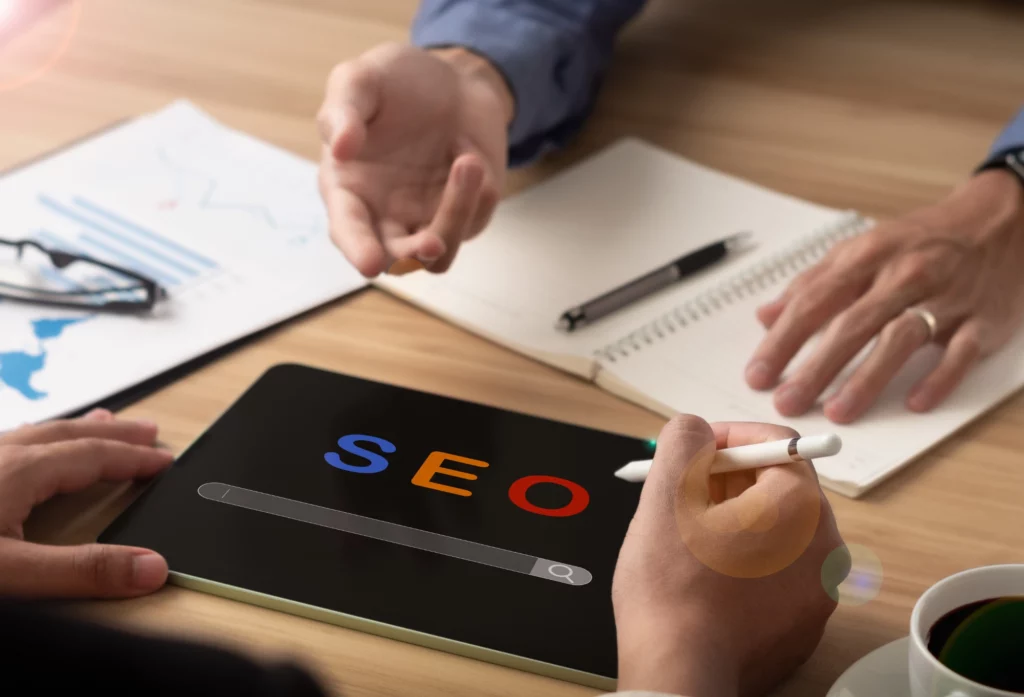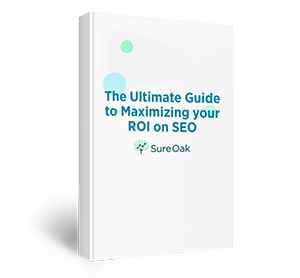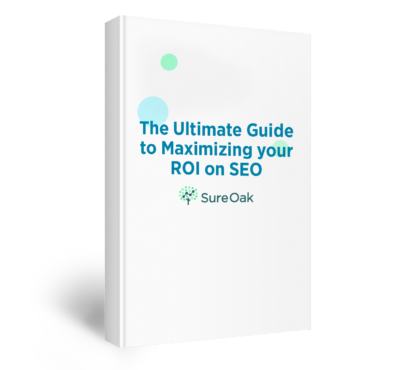
About 40% of people click the first result that pops up when they search for a phrase. That gives the top-ranking result a lot of power. Thankfully, you no longer have to stuff your website full of keywords to rank highly in search results. However, it’s also not just about having high-quality content, either. While you need to provide value to your visitors, you also need to implement effective on-page and off-page SEO tactics to get the best results.
What is On-Page SEO and Off-Page SEO?
The strategies you use to improve your rankings can be divided into on-page and off-page SEO. Both types are important, but they cover different aspects. On-page SEO focuses on optimizing elements on your website, such as the quality of your content, formatting, and title tags. Off-page SEO strategy is about taking action off your website that improves your site’s authority, trustworthiness, and relevance, such as backlinks, guest blogging, and social media marketing.
Technical SEO VS. On-Page SEO
It’s easy to confuse technical SEO with off-page SEO since it concerns your website’s structure. However, technical SEO is a type of on-page SEO because it relates directly to your website. Here’s a more detailed explanation of the benefits of on-page SEO and technical SEO:
Technical SEO
Your technical SEO strategies guarantee your website is easy for Google to find, understand, and index. When you optimize the technical aspects of your website, you’re focused on the structure and setup rather than the content. Technical SEO includes elements such as:
- Site speed: Faster sites provide a better user experience and are favored by search engines.
- Mobile-friendliness: Responsive sites are a must as mobile searches continue to rise and Google’s use of mobile-first indexing.
- SSL/HTTPS: Securing the site with an SSL certificate and transitioning from HTTP to HTTPS makes your site safer.
- XML sitemaps: Creating and submitting sitemaps to search engines helps them find and index pages on the site.
- Site architecture: Designing a logical and straightforward site structure helps search engines and users navigate the site easily.
- URL structure: Implementing SEO-friendly URL structures that are concise and include target keywords makes your site easier to understand and use.
- Robots.txt: Using the robots.txt file to control which parts of the site search engines can crawl will make your site more discoverable.
- Structured data markup: Implementing schema markup helps search engines understand the content of your pages better and provides rich snippets in search results.

On-Page SEO
On-page SEO services center around optimizing the content of each page so that it delivers value to your readers and is relevant to specific search terms. An on-page SEO company will use tactics such as:
- Content quality: High-quality, original content addresses the users’ search queries effectively.
- Keyword optimization: Relevant keywords in the content, title, headings, and meta descriptions help you rank higher for those terms.
- Title tags and meta descriptions: Compelling title tags and meta descriptions encourage click-throughs and include relevant keywords.
- Headings: Headings structure content so it’s easier for readers to skim and help search engines understand the main points of each section.
- Internal linking: Links to other pages within your website help distribute page authority throughout the site and improve navigation for users.
- Image optimization: Compressed images load faster. Descriptive filenames and alt text include relevant keywords.
Benefits of Using Both Onsite and Offsite SEO
When it comes to SEO strategies, more is better — as long as your strategies are authentic and don’t diminish the value of your site. If you’re only focusing on on-page SEO tools, you may have great content to offer, but it might get overlooked because your site is loading too slowly or you’re not considered an authority. By using both on-page and off-page SEO services, your website will:
- Rank higher: On-page SEO improves the content and structure of your website so it’s easier for search engines to find and index your site. Off-page SEO improves your site’s authority, which is a significant factor in rankings.
- Receive more traffic: Targeting specific keywords helps you attract more relevant traffic to your site. Guest blogging, social media marketing, and working with influencers can all funnel traffic to your website from other platforms.
- Create a better user experience: From providing high-value content to loading pages quickly, on-page SEO puts the user first. Off-page SEO also creates a better user experience by providing alternative avenues for interested users to find your site and engage with your content.
- Improve your brand authority and recognition: Building up a website filled with relevant information will help cement your position as an authority in your space. Taking your efforts off-site by building up backlinks and other off-page SEO strategies shows that other people recognize your brand’s authority and give you more credibility.
Why Off-Page SEO is Crucial to Ranking
It’s natural to think that you need to focus all of your efforts on building a great site that accurately represents your brand. Creating high-quality content can be an overwhelming job, so you may not see the point in doing off-page SEO when you have so much work to do on your website.
However, you can’t get off-page SEO benefits by directly working on your site. An off-page SEO company can provide help with:
- Increased credibility: When other reputable sites link to your website, search engines interpret these backlinks as votes of confidence.
- More exposure: The more your website is mentioned in other places, including other sites, social media platforms, and podcasts, the more likely it is that people will discover you.
- Supporting on-page SEO: Your off-page SEO will make your on-page SEO efforts more effective. The more backlinks you have, the more likely it is that your site will show up in specific keyword searches.
- Broader search engine ranking: Off-site SEO helps your website rank for a broad range of keywords, including those you may not have explicitly targeted.

Off-Page and On-Page Strategies: How They Help Your Strategy
The following on-page and off-page strategies work together to increase your site’s ranking. It’s important to do SEO on-page and off-page for the best results.
E-E-A-T
Google can be secretive about how they deliver rank results, but they’ve long encouraged content creators to abide by the acronym E-E-A-T, which stands for Expertise, Authority, Trustworthiness. In late 2022, they added an extra E, Experience.
- Experience means that content created from personal experience is highly valued as it’s more engaging, relatable, and trustworthy to users.
- Expertise refers to the depth of skill or knowledge that a content creator has in a particular field or topic.
- Authoritativeness is the reputation a website or content creator has within their field or industry.
- Trustworthiness includes the accuracy, transparency, and legitimacy of the website and its content, including aspects such as security, clear identification of authorship and sources, evidence-based information, and the absence of deceptive practices.
Link Building
Links are one of the main factors used by search engines like Google to determine the ranking of a website. Strategic link building can also help you build long-term, mutually beneficial relationships. There are several strategies you can use to increase the number of links that point back to your site:
- Create high-quality, valuable content and people will naturally want to link to it.
- Guest blog on other sites to gain backlinks and access a new audience.
- Find broken links on other websites and suggest your website as a replacement.
- Analyze your competitors’ links and target similar sources.
- Build relationships with influencers who will share your content with their audience.
- List your site in relevant, high-quality directories or resource pages that can provide backlinks.
Content Marketing
Effective content optimization strategies include creating, publishing, and distributing content that is tailored to your target audience’s needs and interests, driving profitable customer action. Here are some effective strategies for content marketing and digital PR:
- Understand your audience: Research your target audience’s demographics, preferences, pain points, and search behaviors. From your research, develop detailed buyer personas to tailor your content more precisely to the different segments of your audience.
- Analyze and plan your content: Examine your existing content to identify gaps and opportunities. Create a schedule for publishing your content. A content calendar will help you organize topics, deadlines, and distribution channels, so you’ll have a consistent flow of content.
- Create diverse types of content: Use a mix of content types, such as blog posts, videos, infographics, and podcasts to cater to different preferences and stages of the buyer’s journey. Focus on creating high-quality, original content that provides value and stands out from the competition.
- Do keyword research: Conduct keyword research to find terms your target audience is searching for and incorporate them into your content, including title tags, meta descriptions, and headers.
- Distribute your content: Promote your content across different channels where your audience is, such as social media, email newsletters, and other relevant platforms. You can also repurpose content into different formats to maximize its reach and lifespan.
- Measure your results: Use analytics tools to track the performance of your content, including traffic, engagement, conversion rates, and SEO rankings. Regularly review your content’s performance and use the insights to refine your strategy, topics, and distribution methods.
- Let others generate content for you: Partner with influencers to extend your content’s reach and credibility. You should also encourage your community to create content related to your brand, such as social media posts, reviews, and videos.
Local SEO
According to a 2023 survey, only 2% of people don’t search for local businesses online. Local SEO optimizes your website to show up in local search results. If you have a brick-and-mortar store or provide a local service, this is particularly important. The following methods will help you boost your visibility in local searches:
- Google My Business (GMB) optimization: The first step in local SEO is claiming and optimizing your Google My Business listing. Make sure your business information, such as name, address, phone number, and business hours, is accurate, add current photos, respond to reviews, and regularly update your profile with posts or offers.
- Local keywords: Incorporate local keywords, such as “near me,” “in [City]” and “[Service] in [City]” into your website’s content, meta tags, and URLs.
- On-page SEO elements: Include location-specific information, such as your business address and local phone number, in key areas like the footer or contact page. Schema markup for local businesses can also help search engines better understand and display your business information.
- Local citations and NAP consistency: NAP stands for Name, Address, Phone number. Having consistent NAP information across various directories, including Yelp, Yellow Pages, and local chamber of commerce websites, avoids confusion and increases credibility with potential customers.
- Reputation management and reviews: Encourage happy customers to leave positive reviews on your Google My Business profile and other review sites relevant to your industry. Actively respond to both positive and negative reviews in a professional manner.
- Local link building: Acquire backlinks from local businesses, newspapers, blogs, and other relevant sites.
- Mobile optimization: Ensure your website is mobile-friendly since most local searches are performed on mobile devices.

Technical Website Audits
Technical website audits identify issues that could be causing your website to perform poorly in search engine results pages. Addressing these issues can improve your website’s visibility, user experience, and conversion rates.
Some elements a technical auditor will check include:
- Crawlability: Check if search engines can crawl the site effectively.
- Indexing: Make sure pages are being indexed by search engines.
- URL Structure: Check for clean, descriptive URLs that are easy for users and search engines to understand.
- Page speed: Analyze loading times for pages since speed is a ranking factor and crucial for keeping users engaged.
- Security: Check that the website uses HTTPS encryption, which is important for security and is also a ranking factor.
- Internal links: Check the internal link structure for appropriate links and descriptive anchor text, and make sure important pages receive more internal links.
- External links: Identify and fix broken external links, which can be a negative signal to search engines and a poor experience for users.
- Structured data markup: Check the structured data — schema markup — to make sure it’s used correctly for search engine understanding and rich snippets in SERPs.
Off-Page and On-Page SEO – Better Together
When it comes to SEO, you don’t want to be a one-trick pony. Search engines consider multiple factors when returning rankings. Using both on-page and off-page SEO strategies will improve your search engine ranking results more than using either alone.
If you have any questions, or need additional help with off-page or on-page SEO, the professionals at Sure Oak are here to help! Schedule a free strategy session with us to learn more about how you can improve your rankings.




